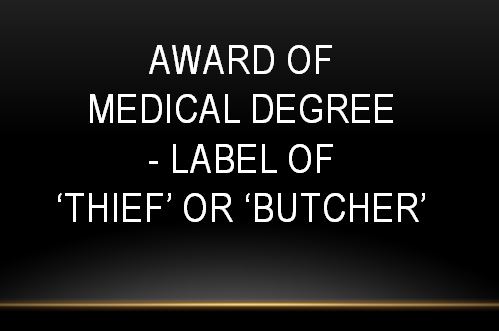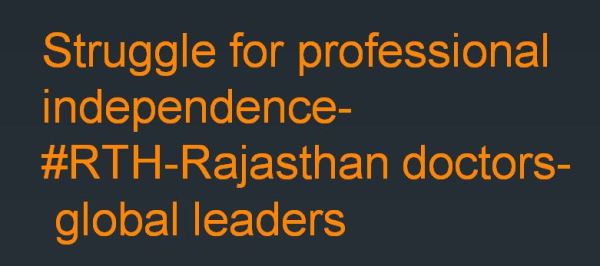The painful incident of Dr Archana Sharma’s Suicide (one year back) had unmasked the everyday struggle of the doctors in the present era. Her supreme sacrifice depicted the plight of doctors- being undervalued and demonized, forced to work as a sub-servant to bureaucrats, irresponsible policing, blackmail by goons and vulture journalism-all have become an accepted form of harassment. Her suicide has unveiled the despondency, moral burden of mistrust that doctors carry. Her death was the result of the apathy of fair justice that eludes medical community. Sadly, the society still is unable to realize its loss.
Let her sacrifice be a reminder to the whole medical fraternity; either fight against the prevalent injustice or perish, not being able to treat the patients would be a greater disservice to humanity.
Such incidents show that goons, public, regulators and administrators can use the nature of doctors’ work to be used against medical profession to make saviours as an easy prey for punishments on the pretext of dishonesty, negligence or semantics being used as legal weapons by law-enforcers, even in case of a perceived bias. In the process of such ‘tokenism’ goons and administrators prove their relevance to the medical system.
Private health care has become a predominant mode of health care delivery. The failure of public sector is mainly due to poor infrastructure and inept health management. Sadly health is being managed by administrators, who have never treated a patient in life-time. Inadequacy of public sector stems from the government inability to take responsibility of delivering quality accessible healthcare. This has added to the distress and has accelerated privatisation of health care.
Instead of making the process of opening a health care centre or hospital an easier process, it has been made a herculean task. Getting many dozens of licences is not easy. Doctors who try to open hospitals complain about numerous hurdles, but possibly are left with no option. It is still easier for big hospitals with investors’ money but difficult for doctors on their own. Running the hospital is no more an easy task due to bureaucratic and public pressures.
Private health sector especially smaller hospitals feel burdened by government schemes because of unrealistically low reimbursement rates for surgeries or procedures. Not only unreasonably low reimbursement payments are forced upon doctors but are delayed due to many unpleasant factors in government system.
There is no protection to doctors against physical assaults. Local goons and mobs easily get away with abusing and attacking doctors. The health care workers have become scapegoats for the inadequate and inept medical system.
Rather than developing a system to promote good doctor-patient relationship, Medical Consumer Protection Act has been imposed and created a situation of ‘us versus them syndrome’. It caused erosion of doctor-patient relationship and escalated cost of care. Propagation of stray and occasional incidents about negligence case in court or their outcomes are given disproportionate wide publicity in media. The patients are unable to understand the correct application of such stray incidents to themselves.
There is a growing mutual mistrust; doctors too have started looking at every patient as a potential litigant. Especially while dealing with very sick ones, practice of defensive medicine is a natural consequence.
To save themselves, doctors have to do mammoth paper work, leading to consumption of time that was meant for real deliberations for the benefit of patients.
Consequently insurance companies, medical industry and lawyers have become indispensable and have positioned themselves in between doctor and patients. Besides creating a rift between doctor and patient, they charge heavily from both sides; from patients (medical insurance, lawyer fee) and doctors (indemnity insurance, lawyer’s fee) alike. The vicious cycle of rising costs, need for insurance, medicolegal suits, and high lawyer fee (for patients and doctors) goes on unabated.
In reality it is not only the #RTH, it is the overall unfair, unsupportive and exploitive and punitive ecosystem for doctors, which is painful. Doctors are finding actually difficult to work in such environment.
Possibly it is a last cry before they quit or perish, if still remain unheard.
Advantages-Disadvantage of being a doctor
25 factors- why health care is expensive
21 occupational risks to doctors and nurses
Covid paradox: salary cut for doctors other paid at home
Medical-Consumer protection Act- Pros and Cons
Expensive Medical College seat- Is it worth it?
NEET- Not so Neat- percentile system
The Myth of cost of spending on medical education needs to be made transparent.











